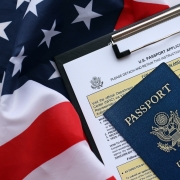Good Trouble Lives On: Honoring Congressman John Lewis with a National Day of Action
By Pearl Phillip |Editorial credit: Ryan Rahman / Shutterstock.com
Congressman John Lewis, the late civil rights icon and U.S. Representative from Georgia’s 5th District, remains one of the most enduring symbols of courage, resilience, and justice in American history. Known for his unwavering dedication to nonviolent activism, Lewis’ legacy transcends generations. As America continues to grapple with inequality, voter suppression, and systemic injustice, the call to honor his memory has materialized into an annual National Day of Action. This day celebrates Lewis’s life, legacy, and the enduring philosophy he popularized: making ‘Good Trouble,’ such as leading peaceful marches, organizing sit-ins, and advocating for legislative change.
A Legacy of Courage and Change
John Robert Lewis was born on February 21, 1940, in Troy, Alabama. From a young age, he was inspired by Dr. Martin Luther King Jr. and the Montgomery Bus Boycott. Lewis rose to prominence as one of the original 13 Freedom Riders, challenging segregation in the South. He endured beatings, arrests, and threats, but remained committed to nonviolence. As chairman of the Student Nonviolent Coordinating Committee (SNCC), Lewis played a pivotal role in organizing key events in the Civil Rights Movement, including the 1963 March on Washington.
However, it was on March 7, 1965, a day now known as “Bloody Sunday,” that Lewis etched his name into the nation’s conscience. Leading over 600 peaceful marchers across the Edmund Pettus Bridge in Selma, Alabama, Lewis suffered a skull fracture at the hands of state troopers. The brutal images broadcast nationwide helped galvanize public support for the passage of the Voting Rights Act of 1965, a legislative milestone that Lewis considered one of his proudest achievements.
Congressional Service and Legislative Impact
Elected to Congress in 1986, Lewis served for over three decades as the Representative for Georgia’s 5th Congressional District. During his time in office, he became known as the “Conscience of the Congress.” He championed legislation on voting rights, education, health care, and gun control. Lewis was instrumental in the creation and renewal of the Voting Rights Act, co-authored the Emmett Till Unsolved Civil Rights Crime Act, and persistently fought to expand and protect civil liberties for all Americans.
Even as a senior lawmaker, Lewis never abandoned grassroots activism. He famously led a 2016 House sit-in to demand action on gun reform, echoing his roots in civil disobedience. His leadership style was humble, grounded, and unwavering in principle.
His Passing and the Rise of a Movement
Congressman Lewis passed away on July 17, 2020, after a battle with pancreatic cancer. His death was met with an outpouring of grief and reverence. From a horse-drawn carriage over the Edmund Pettus Bridge to a funeral at Ebenezer Baptist Church, Lewis was laid to rest as an American hero.
In the days following his death, activists, lawmakers, and communities across the country vowed to keep his mission alive. His call to “get in good trouble, necessary trouble” became a rallying cry. From marches to voter registration drives, Lewis’ passing reignited a national movement.
Good Trouble Lives On: National Day of Action
To preserve his legacy, the “Good Trouble Day of Action“ has been established as an annual event, observed every July 17, the anniversary of his death. It serves as a nationwide mobilization effort to promote civic engagement, voting rights, racial equity, and peaceful protest. Civil rights groups, churches, students, and everyday citizens join in coordinated activities such as:
- Voter registration drives
- Legislative advocacy for the John Lewis Voting Rights Advancement Act
- Educational seminars on civil disobedience and history
- Peaceful rallies and community forums
These efforts affirm that Lewis’ work is not done. In fact, in a time of rising voter suppression laws, racial tension, and social division, his call to action is more urgent than ever. The challenges we face today make it imperative for us to continue his work and fight for the rights and equality he dedicated his life to.
Carrying the Torch Forward
John Lewis’ life was a testament to the power of perseverance, the moral strength of nonviolence, and the enduring impact of ‘good trouble.’ As we honor his memory on the National Day of Action each July 17, we are called not only to remember—but to act. Whether through marching, voting, organizing, or simply speaking out, we all have a role to play in carrying forward his legacy. His impact is not confined to the past, but it continues to inspire and guide us in our present and future actions.
As Lewis wrote in his final letter to the American people: ‘Now it is your turn to let freedom ring.’ His words are not just a call to action, but a reminder of the responsibility we all share in upholding the principles of freedom and equality that he fought for.
Indeed, good trouble lives on. And it must.





Leave a Reply
Want to join the discussion?Feel free to contribute!